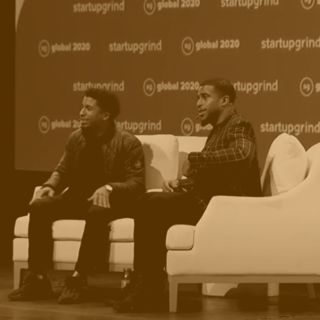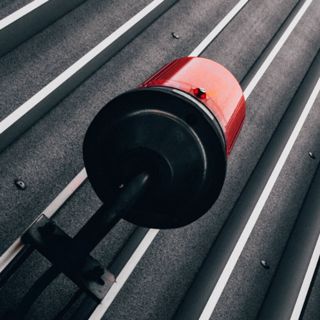
The Next Generation of Cultural Influencers in Tech
This episode—which originally took place as a live event—is a conversation between Seattle Seahawks linebacker Bobby Wagner and a16z Cultural Leadership Fund partner Chris Lyons. Wagner is known for his power on the field and his business acumen off it. Last year, he negotiated his own three-year, $54 million contract extension to become the highest-paid middle linebacker in the NFL. In this candid conversation, Wagner and Lyons discuss how to identify standout companies and talent (for better or worse), the growing influence of cultural leaders in tech, and the potential of "shared genius."
2 Maj 202013min

The Chief Security Officer in (and out of) a Crisis
The Chief Security Officer (CSO/CISO) used to manage on-premise servers, now the information they have to secure has migrated to the cloud. As the responsibility of CSOs has expanded, the role has moved from technical IT to the boardroom. How do the best CSOs prepare for and respond to a crisis, from redteaming to comms? What responsibility should cloud & SaaS vendors, not to mention the government, have in security and data breaches? And how is the role going to evolve in the next five years? At our a16z Innovation Summit last year, we sat down with two security leaders whose career has evolved as the role has – Joe Sullivan, former CSO at Uber and Facebook, now at Cloudflare and Joel de la Garza, current security partner at a16z, formerly CISO at Box.
29 Apr 202020min

Journal Club: Finding New Antibiotics with Machine Learning, What Coronavirus Structures Tell Us
a16z Journal Club (part of the a16z Podcast), curates and covers recent advances from the scientific literature -- what papers we’re reading, and why they matter from our perspective at the intersection of biology & technology (for bio journal club). This inaugural episode covers 2 different topics, in discussion with Lauren Richardson:0:26 #1 identifying new antibiotics through a novel machine-learning based approach -- a16z general partner Vijay Pande and bio deal partner Andy Tran discuss the business of pharma; the specific methods/ how it works; and other applications for deep learning in drug discovery and development based on this paper:"A Deep Learning Approach to Antibiotic Discovery" in Cell (February 2020), by Jonathan Stokes, Kevin Yang, Kyle Swanson, Wengong Jin, Andres Cubillos-Ruiz, Nina Donghia, Craig MacNair, Shawn French, Lindsey Carfrae, Zohar Bloom-Ackermann, Victoria Tran, Anush Chiappino-Pepe, Ahmed Badran, Ian Andrews, Emma Chory, George Church, Eric Brown, Tommi Jaakkola, Regina Barzilay, James Collins11:43 #2 characterizing the novel coronavirus causing the COVID-19 pandemic -- a16z bio deal partner Judy Savitskaya shares what we can learn from the protein structures; the relationship to the 2002-2004 SARS epidemic; and more based on these two research articles: "Structure, Function, and Antigenicity of the SARS-CoV-2 Spike Glycoprotein" in Cell (April 2020), by Alexandra Walls, Young-Jun Park, M. Tortorici, Abigail Wall, Andrew McGuire, David Veesler"Cryo-EM structure of the 2019-nCoV spike in the prefusion conformation" in Science (March 2020), by Daniel Wrapp, Nianshuang Wang, Kizzmekia Corbett, Jory Goldsmith, Ching-Lin Hsieh, Olubukola Abiona, Barney Graham, Jason McLellanYou can find these episodes at a16z.com/journalclub.
26 Apr 202024min

Introducing Journal Club
Announcing a16z Journal Club, a new show where we curate and discuss recent research papers with a16z experts and others. This new show continues the a16z Podcast mission of not just bringing you conversations about the future (as well as about building companies for this), but of also putting specific trends in context -- whether through news (as with our other show 16 Minutes), or, through journal articles (as with this new show -- which will soon have its own feed as well). The first episode, of bio journal club, focuses on why specific scientific advances matter from our perspective at the intersection of biology & technology. It is hosted by one of our a16z bio editors, Lauren Richardson, a former senior editor of open-access journal PLOS Biology with a background in cell and molecular biology and genetics (and with a Ph.D. from the University of Washington and a postdoctoral fellowship at UC Berkeley).You will hear it next in this feed, and can also find new episodes here as they come out every few weeks and at a16z.com/journalclub. ~sonal
26 Apr 20201min

What the Narrow Waist of the Internet Means for Innovation Today
Here is Ali's tweetstorm on the Narrow Waist of Blockchain Computing
24 Apr 202040min

IT'S TIME TO BUILD
“It's Time to Build” by Marc Andreessen. You can also find and share this essay at a16z.com/build
21 Apr 202012min

Introducing Read Alouds
We wanted to let you know about a special new series of posts occasionally read out loud from us (you can learn more about the why and why now in episode #500 on how we podcast); we may release these in a separate feed in future, for now, the first episode is next in this feed. Thank you for listening!You can also check out our other shows and series:16 MinutesHustlin' Tech
21 Apr 202033s

The Passion Economy: Redefining Work
This episode of the a16z Podcast covers the the rise of online platforms that enable people to make a living off their unique interests and skills. It's a trend that's become increasingly relevant as the demand for virtual work grows. The discussion -- with Patreon cofounder and CTO Sam Yam and a16z consumer tech partner Li Jin in conversation with Lauren Murrow -- covers the new forms of work made possible by these online platforms, why creators today are effectively making more money off fewer fans, and what all of this means for the future of entrepreneurship.See more on the Passion Economy, metrics for it, 100 True Fans, and more at a16z.com/creatoreconomies.
18 Apr 202026min





















